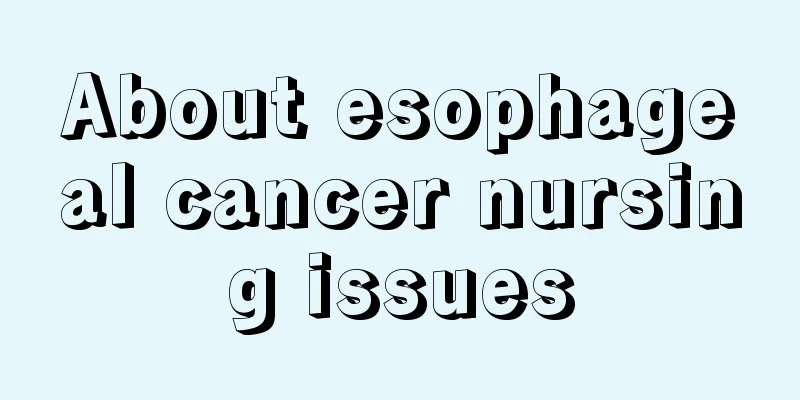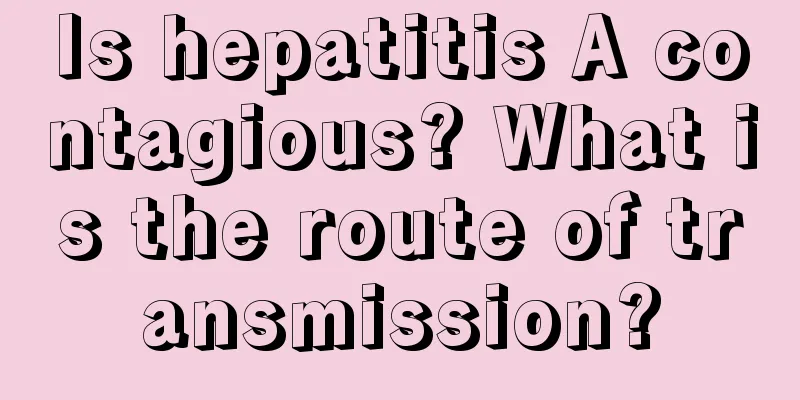About esophageal cancer nursing issues

|
How should patients with esophageal cancer be cared for? In fact, many people are not clear about this. Let us let the experts explain to you what are the care methods for esophageal cancer that we must know and what we should do in Suqian? After the operation, what kind of care should we provide to alleviate the condition of esophageal cancer? 1. Preoperative care 1. Psychological care Patients have progressive dysphagia, are becoming increasingly thin, have poor tolerance to surgery, lack confidence in treatment, and have a certain degree of fear of surgery. Therefore, we should explain, comfort and encourage the patient's psychological state, establish a fully trusted nurse-patient relationship, make the patient realize that surgery is a thorough treatment method, and make him willing to accept the surgery. 2. Enhance nutrition. Those who can still eat should be given a high-calorie, high-protein, high-vitamin liquid or semi-liquid diet. Those who cannot eat should be given intravenous water, electrolytes and calories. Patients with hypoproteinemia should be corrected by blood transfusion or plasma protein. 3. Gastrointestinal tract preparation ① Pay attention to oral hygiene; ② Place a gastric tube and duodenal drip tube before surgery; ③ Fasting before surgery. For those with food retention, flush the esophagus with isotonic saline the night before surgery, which is beneficial to reduce tissue edema and reduce the incidence of postoperative infection and anastomotic leakage; ④ For those who plan to undergo colon replacement of esophagus, they must follow the colon surgery preparation and care before surgery, see preoperative preparation for colorectal cancer. 4. Preoperative exercises teach patients deep breathing, effective coughing, expectoration, defecation in bed and other activities. 2. Postoperative Care 1. Keep the gastrointestinal decompression tube unobstructed. A small amount of blood drained out 24 to 48 hours after surgery should be considered normal. If a large amount of blood is drained, the doctor should be notified immediately. The gastrointestinal decompression tube should be retained for 3 to 5 days to reduce the tension of the anastomosis and facilitate healing. Pay attention to the accurate connection of the gastric tube, firm fixation, prevention of dislocation, and smooth drainage. 2. Closely observe the amount and nature of chest drainage. If abnormal bleeding, turbid fluid, food residues or chyle are found in the chest drainage fluid, it indicates active bleeding, esophageal anastomotic fistula or chylothorax in the chest cavity. Appropriate measures should be taken to make a clear diagnosis and treat it. If there is no abnormality, the drainage tube should be removed 1 to 3 days after surgery. We have probably learned about the preoperative and postoperative care methods for esophageal cancer. The editor reminds everyone that the intestines will not be cured by surgery, and if the patient eats indiscriminately, esophageal cancer will still recur. Therefore, paying attention to eating is one thing that esophageal cancer patients must pay attention to. Secondly, esophageal cancer patients must maintain an optimistic attitude and avoid worsening their condition. |
<<: What foods are better for esophageal cancer
>>: Causes of primary bronchogenic lung cancer
Recommend
What are the dietary considerations for bladder cancer patients
Nowadays, there are more and more cancer patients...
What are the correct treatments for skin cancer?
Skin cancer is a malignant tumor disease that is ...
Common factors that lead to cervical cancer in life
Women can also suffer from many cancer diseases, ...
What to do if you can't sleep in a different place
Insomnia is a common problem when people sleep, e...
Radical prostatectomy for stage 4 prostate cancer
Radical surgery for prostate cancer stage 4: Surg...
What kind of wine can remove dampness
Drinking a moderate amount of alcohol can remove ...
High temperature cooking bag
The high-temperature cooking bag is a magical thi...
Is Chlorphenamine Huangmin Tablets harmful?
Chlorfenapyr tablets are a compound preparation, ...
How to wash off the red dragon fruit juice
We all know that the nutritional value of pitaya ...
How much does a brain cancer check cost
The issue of hospital examinations and drug charg...
What should patients with advanced liver cancer eat? What are the dietary requirements for advanced liver cancer?
What should I eat in the late stage of liver canc...
What are the effects of hysterectomy? Will hysterectomy affect sexual function?
Hysterectomy is very harmful to women and may hav...
Which hospitals treat fibroids?
What are the hospitals that treat fibroids? Nowad...
How long can patients with advanced colon cancer live
How long can you live with advanced colon cancer?...
Does moxa stick have a shelf life?
Moxibustion is a health care method chosen by man...









